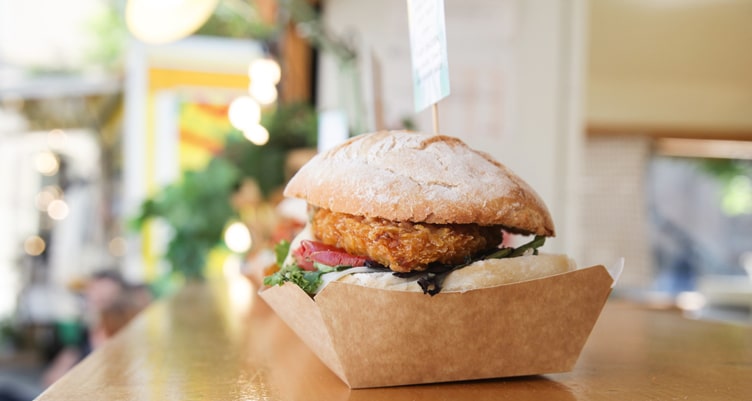
[tldr]
- Using plant-based foods and binders, vegan meat brands offer a cruelty-free option for animal protein that tastes and looks similar to the real thing.
- While it avoids the problems of factory-farmed meat, vegan meat still contains a laundry list of ingredients that won’t make you feel your best.
- You don’t have to swear off steaks to help the environment. Supporting organic farms and buying high-quality meat helps, too.
[/tldr]
Waltz up to your grocery store meat case, and you’re more likely than ever to find a new alternative: Vegan meat. These plant-based burger patties and sausages look and, in some cases, even taste just like the real thing, while posing as a sustainable and cruelty-free alternative to beef and pork. Can you really get the same power from this new kind of protein?
Besides getting less satisfaction (and possibly more disaster pants — aka diarrhea) from plant-based meat, these beefed-up alternatives may not be that much better for you — or the planet. Here’s why vegan meat is less mighty than you think, plus better ways to eat for the environment.
Download the Bulletproof Diet Roadmap for a complete list of proteins that keep you full and focused
What is vegan meat made of?
Vegan meat brands advertise their patties, crumbles, and sausages as a complete replacement for animal protein. Using a mix of plant-based foods and binders, you can cook a faux-meat dish that looks and tastes strikingly similar to the real thing. Some of these vegan meat offerings also contain no gluten, soy, or GMOs.
For anyone focused on a cruelty-free diet, vegan meat looks like a viable option because it doesn’t require slaughtering animals. Plus, it eliminates the troublesome issues with factory-farmed meat, such as loading cows with cheap grains and antibiotics that make you feel like trash by the last bite.
We can agree that animals that eat garbage and grow up in confined spaces won’t produce meat that makes you feel amazing — but the vegan alternative isn’t as wholesome as you think, either.
Problems with vegan meat substitutes
Gut-damaging ingredients
Burger patties typically contain one ingredient: Meat. Pick up the vegan version, though, and you’ll find additions like pea protein, canola oil, yeast, and mystery “natural flavors.”
Sure, they’re all technically plant-based ingredients, but not all forms of plants will help you feel your best. Yeast contains mold toxins that will throw your gut health into a tailspin, peas contain lectins that mess with your joints, and canola oil contains inflammatory trans fats. These are only a portion of ingredients you can find in vegan meat — and while they may taste great, they won’t make you feel as good.
Poor nutrition
The nutritional value in vegan meat can’t hold a candle to animal meats, either. Vegan diets are known for causing nutrient deficiencies, as well as increasing your intake of less optimal fats. Grass-fed beef contains more quality saturated fat and protein per serving than the average vegan patty, so you’ll just feel better after eating it.
In addition to those higher-quality fats and protein, pastured meat contains more bioavailable vitamins you can’t easily get from plants — all without the antinutrients that make you weak.
Environmental impact
Is vegan meat really better for the planet? The answer is complicated.
In studies comparing the environmental impacts of vegan diets against meat eaters, meat does make a larger footprint.[ref url=“https://www.ncbi.nlm.nih.gov/pmc/articles/PMC5522483/”] However, the way you source your food matters. A vegan living off processed soy ice cream and french fries may not serve our soil’s biodiversity as well as an omnivore eating pastured meats and butter from happy cows.
Why? Ruminant animals — especially the happy, pastured kind — help fertilize the soil and maintain its natural nutrient density. Without them, we depend on artificial fertilizers that tilt our soil’s ecosystem out of balance.
Plus, vegan meat may not come cruelty-free. Harvesting crops for these plant patties may include industrial farming practices that harm bees or small animals. Eating a grass-fed burger does sacrifice a cow’s life, but causes the least harm to animals as a whole.[ref url=“https://link.springer.com/article/10.1023%2FA%3A1025638030686?LI=true”]
Whether you eat meat or not, your diet will do more for the planet if you pay attention to how your food got to your plate.
Better ways to eat meat (or less of it)
- When you eat meat, go grass-fed. It tastes better and improves soil quality. Look for beef from small, local farms whenever possible.
- Eat more fat. Too much meat puts stress on your digestive system, and the protein you don’t use turns to glucose and stores as fat in your body. Instead of going for seconds on bacon, enjoy a heaping scoop of guacamole instead.
- Diversify your protein sources. Don’t just cook beef — enjoy wild-caught fish and eggs from happy chickens, too. Learn more here about the best healthy sources of protein.
- Eat more organic foods, and less processed junk. Organic food makes a difference because it creates healthier soil and more sustainable farms. Prepackaged and prepared foods (even organic ones) use more environmental resources.
Read Next: What to Know Before Going Vegan











